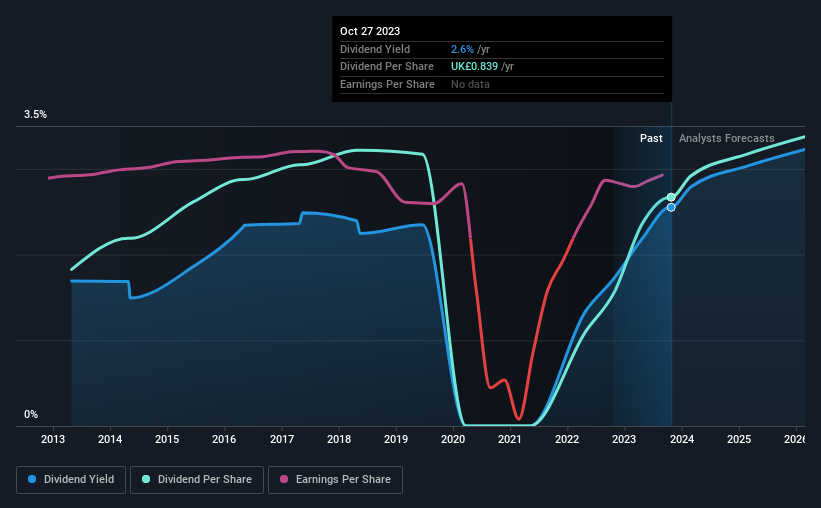Interested In Whitbread's (LON:WTB) Upcoming UK£0.34 Dividend? You Have Four Days Left
It looks like Whitbread plc (LON:WTB) is about to go ex-dividend in the next four days. The ex-dividend date occurs one day before the record date which is the day on which shareholders need to be on the company's books in order to receive a dividend. The ex-dividend date is important as the process of settlement involves two full business days. So if you miss that date, you would not show up on the company's books on the record date. This means that investors who purchase Whitbread's shares on or after the 2nd of November will not receive the dividend, which will be paid on the 8th of December.
The company's upcoming dividend is UK£0.34 a share, following on from the last 12 months, when the company distributed a total of UK£0.84 per share to shareholders. Based on the last year's worth of payments, Whitbread stock has a trailing yield of around 2.6% on the current share price of £32.88. Dividends are an important source of income to many shareholders, but the health of the business is crucial to maintaining those dividends. As a result, readers should always check whether Whitbread has been able to grow its dividends, or if the dividend might be cut.
See our latest analysis for Whitbread
If a company pays out more in dividends than it earned, then the dividend might become unsustainable - hardly an ideal situation. That's why it's good to see Whitbread paying out a modest 50% of its earnings. Yet cash flows are even more important than profits for assessing a dividend, so we need to see if the company generated enough cash to pay its distribution. Thankfully its dividend payments took up just 33% of the free cash flow it generated, which is a comfortable payout ratio.
It's positive to see that Whitbread's dividend is covered by both profits and cash flow, since this is generally a sign that the dividend is sustainable, and a lower payout ratio usually suggests a greater margin of safety before the dividend gets cut.
Click here to see the company's payout ratio, plus analyst estimates of its future dividends.
Have Earnings And Dividends Been Growing?
When earnings decline, dividend companies become much harder to analyse and own safely. If earnings decline and the company is forced to cut its dividend, investors could watch the value of their investment go up in smoke. So we're not too excited that Whitbread's earnings are down 2.5% a year over the past five years.
The main way most investors will assess a company's dividend prospects is by checking the historical rate of dividend growth. Whitbread has delivered 3.9% dividend growth per year on average over the past 10 years.
Final Takeaway
Is Whitbread an attractive dividend stock, or better left on the shelf? Earnings per share are down meaningfully, although at least the company is paying out a low and conservative percentage of both its earnings and cash flow. It's definitely not great to see earnings falling, but at least there may be some buffer before the dividend needs to be cut. While it does have some good things going for it, we're a bit ambivalent and it would take more to convince us of Whitbread's dividend merits.
With that in mind, a critical part of thorough stock research is being aware of any risks that stock currently faces. Case in point: We've spotted 1 warning sign for Whitbread you should be aware of.
A common investing mistake is buying the first interesting stock you see. Here you can find a full list of high-yield dividend stocks.
Have feedback on this article? Concerned about the content? Get in touch with us directly. Alternatively, email editorial-team (at) simplywallst.com.
This article by Simply Wall St is general in nature. We provide commentary based on historical data and analyst forecasts only using an unbiased methodology and our articles are not intended to be financial advice. It does not constitute a recommendation to buy or sell any stock, and does not take account of your objectives, or your financial situation. We aim to bring you long-term focused analysis driven by fundamental data. Note that our analysis may not factor in the latest price-sensitive company announcements or qualitative material. Simply Wall St has no position in any stocks mentioned.

